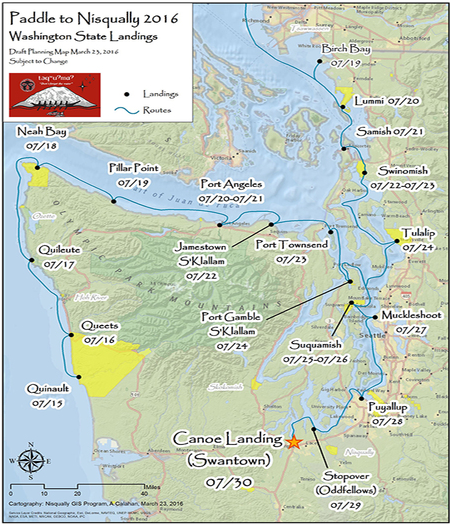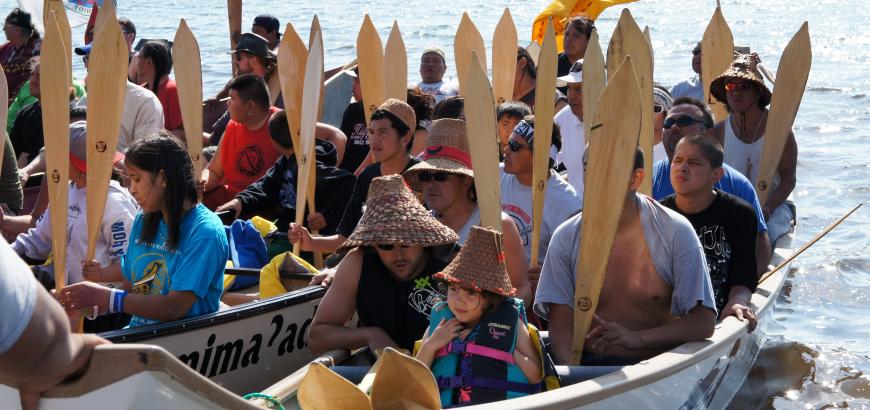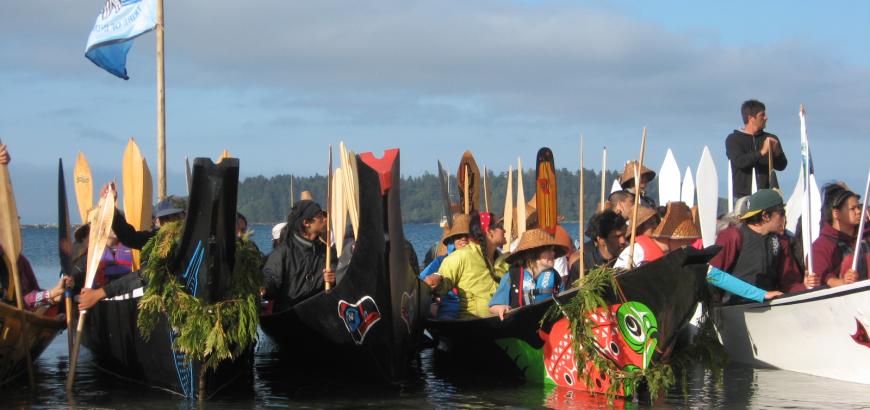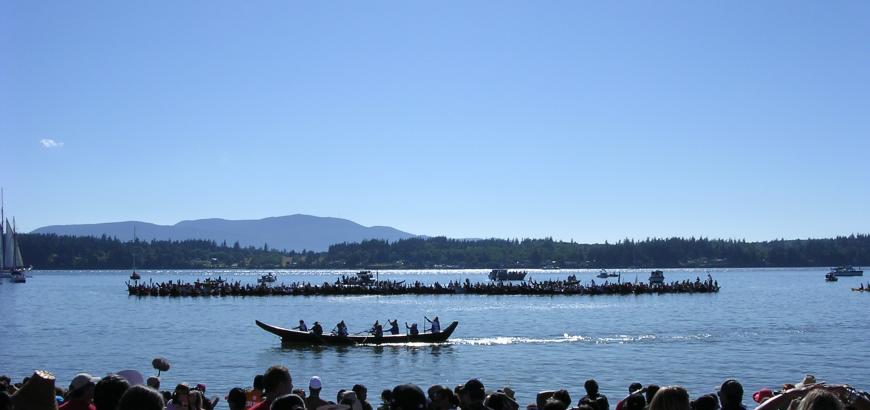AIS is offering an exciting summer learning opportunity: a Tribal Canoe Journey field course. Anyone can take a UW Summer Quarter course: UW students, visiting students from other colleges, high school students, and those who are not currently enrolled in any school. Tuition and fees apply. The UW Access program allows Washington state residents ages 60 and older to audit courses on a space-available basis for the registration fee of $5.
Summer Session B-term Class meets M T W Th 10:20 AM - 12:30 PM July 21, 25, 26, and 27th to prepare to serve, and learn at the Annual Tribal Canoe Journey July 29-August 6th, hosted this year by the Nisqually Tribe. The class will camp with the canoe families traveling to the Nisqually reservation. The class will meet one final time on campus after returning to reflect on the learning experience.
Detailed event background and information is available at the Paddle to Nisqually website.
Contact Instructor for more information: cupdegra@uw.edu

Course Description
Students participate in activities associated with the hosting of the Annual Tribal Canoe Journey at Nisqually. Camping facilities and most meals are provided by the host. Learning is focused on the ecology of the Salish Sea, Coast Salish culture, the many and continuing impacts of settlement to the ecosystems and culture, and the Annual Tribal Canoe Journey. This event has grown from a few canoes to over a hundred, and thousands of people participating annually. Tribal Canoe Journey is creating cultural renewal across the region.
The course will begin on campus and provide an interdisciplinary academic framework based on praxis, preparing ourselves to use theory, practice, and reflection as a learning method, before we organize ourselves to travel and camp at the event. Once there, our day will be centered in daily service, and building a learning community informed by the Ten Rules of the Canoe. Our learning methods are experiential and service-based, and dependent on personal and group reflection. Gifting is an integral part of the event; we will prepare in advance to give gifts to our hosts.
Learning Objectives
To understand the context of the changing environment and people of the Salish Sea, the ecosystems and knowledge developed here over time, and gain a sense of community, and explore our personal relationship to this knowledge.
Learning Experiences
- Class consists of immersion through community building and serving the Paddle to Nisqually Event
- Activities include daily Cultural Protocol, large group and small discussions, and a series of field experiences focused on the ecosystems of the Pacific Northwest
- Readings include papers and chapters from the fields of environmental history, geology, ecology, botany, anthropology, traditional ecological knowledge, and restoration
Learning Assignments
- Community building and participation are central to our learning experience, including daily service to the larger event.
- Integrate the diverse disciplines covered in the course through a practice of multiple ways of learning about our subjects using observation, drawing, writing, reading, communicating and reflecting.
- Create a comprehensive field journal for the off-campus and field component of the course that employs observation, illustration, writing and reflecting to document your learning experience.
- Final written 7-10 paged double-spaced paper that integrates experiential learning, readings and reflection.
Evaluation
There are four principal evaluation criteria for the course: 1) Overall attendance, and participation in regular class meetings and field trips, including the mandatory excursion, volunteering opportunities, and Cultural Protocol 2) reading assignments, 3) Field Journal/ Sketchbook including notes, field sketches, and journaling, 4) a final course reflection project. Assessment of assignments will be based on the quality of completed work, arranged in a Course Portfolio.
The first three criteria apply to in-class and field discussions, as well as volunteer service and community engagement. Students participated in cultural workshops and in-class discussions to prepare for the larger event. The success of these discussions depends on students acting as teachers as well as learners, and so their active and sincere participation is essential. Student-centered discussion is used to engage the Ten Rules of the Canoe, course reading material, and the development of a learning community. Students participate in “Green Team”, and will be oriented to the Nisqually Reservation by the Department of Natural Resources, a case study of forestry, and field experience with the goal of increasing our collective understanding of the local environment.
THE TEN RULES OF THE CANOE
1. EVERY STROKE WE TAKE IS ONE LESS WE HAVE TO MAKE
Keep going! Even against the most relentless wind or retrograde tide, somehow a canoe moves forward. This mystery can only be explained by the fact that each pull forward is a real movement and not a delusion.
2. THERE IS TO BE NO ABUSE OF SELF OR OTHERS
Respect and trust cannot exist in anger. It has to be thrown overboard, so the sea can cleanse it. It has to be washed off the hands and cast into the air, so the stars can take care of it. We always look back at the shallows we pulled through, amazed at how powerful we thought those dangers were.
3. BE FLEXIBLE
The adaptable animal survives. If you get tired, ship your paddle and rest. If you get hungry, put in on the beach and eat a few oysters. If you can’t figure one way to make it, do something new. When the wind confronts you, sometimes you’re supposed to go the other way.
4. THE GIFT OF EACH ENRICHES ALL
Every story is important. The bow, the stern, the skipper, the power puller in the middle – everyone is part of the movement. The elder sits in her cedar at the front, singing her paddle song, praying for us all. The weary paddler resting is still ballast. And there is always that time when the crew needs some joke, some remark, some silence to keep going, and the least likely person provides.
5. WE ALL PULL AND SUPPORT EACH OTHER
Nothing occurs in isolation. When we aren’t in the family of a canoe, we are not ready for whatever comes. The family can argue, mock, ignore each other at its worst, but that family will never let itself sink. A canoe that lets itself sink is certainly wiser never to leave the beach. When we know that we are not alone in our actions, we also know we are lifted up by everyone else.
6. A HUNGRY PERSON HAS NO CHARITY
Always nourish yourself. The bitter person, thinking that sacrifice means self-destruction, shares mostly anger. A paddler who doesn’t eat at the feasts doesn’t have enough strength to paddle in the morning. Take that sandwich they throw at you at 2.00 A.M.! The gift of who you are only enters the world when you are strong enough to own it.
7. EXPERIENCES ARE NOT ENHANCED THROUGH CRITICISM
Who we are, how we are, what we do, why we continue, flourish with tolerance. The canoe fellows who are grim go one way. The men and women who find the lightest flow may sometimes go slow, but when they arrive they can still sing. And they have gone all over the sea, into the air with the seagulls, under the curve of the wave with the dolphin and down to the whispering shells, under the continental shelf. Withdrawing the blame acknowledges how wonderful a part if it all every one of us really is.
8. THE JOURNEY IS WHAT WE ENJOY
Although the start is exciting and the conclusion gratefully achieved, it is the long, steady process we remember. Being part of the journey requires great preparation; being done with a journey requires great awareness; being on the journey, we are much more than ourselves. We are part of the movement of life. We have a destination, and for once our will is pure, our goal is to go on.
9. A GOOD TEACHER ALLOWS THE STUDENT TO LEARN
We can berate each other, try to force each other to understand, or we can allow each paddler to gain awareness through the ongoing journey. Nothing sustains us like that sense of potential that we can deal with things. Each paddler learns to deal with the person in front, the person behind, the water, the air, the energy; the blessing of the eagle.
10. WHEN GIVEN ANY CHOICE AT ALL, BE A WORKER BEE – MAKE HONEY!
The Ten Rules of the Canoe were developed by the Quileute Canoe contingent for a Northwest Experimental Education Conference in 1990.


